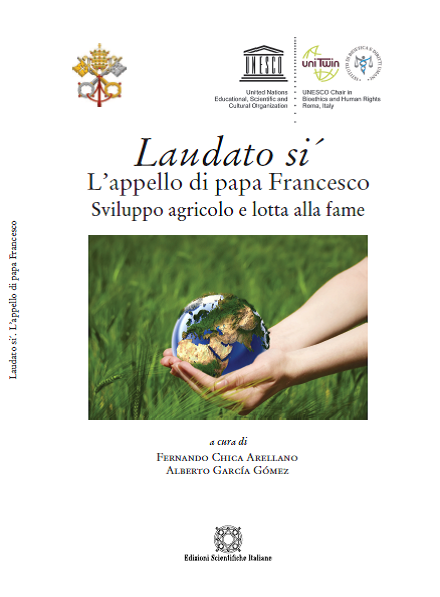The recently published book Laudato si’ the Appeal of Pope Francis: Agricultural development and the fight against hunger gathers reflections from the November 2015 event “Agricultural development and the fight against hunger. The call of Pope Francis’ encyclical Laudato si’.” The meeting was sponsored by the Permanent Observer Mission of the Holy See to the United Nations together with the Pontifical Athenaeum Regina Apostolorum and the European University of Rome and in collaboration with the UNESCO Chair in Bioethics and Human Rights. The volume is edited by Fernando Chica Arellano, Permanent Observer of the Holy See to the United Nations Food and Agricultural Organizations, including the F.A.O., I.F.A.D., and W.F.P. and by Alberto Garcia Gomez, UNESCO Chair Director.
The goal is this book is to response profoundly to Pope Francis’s appeal to care for our “common home.” The work gathers the reflections of experts from different fields of knowledge and experience, including the Social Doctrine of the Church, Theology, Philosophy, Law and Bioethics. Contributors include representatives of international organizations and those who work in service of the Holy See.
Like never before, we need concrete and effective action before it is too late to care for the natural environment. The agricultural sector in particular needs workers who can recover a sense of their mission, which is essentially human and not economic. This text highlights the different lines of thought of the encyclical that can be summarized as a pedagogy to propose possible actions, and above all, to indicate ways in which to form individuals, groups and communities in an consciousness of safeguarding our “common home.”
Confrontation with the various experiences lived in different countries and the unceasing questions for help from the rural world directed toward international institutions are tangible signs of a concern for the support of practical solutions. But Laudato si‘ tells us that this same concern also relates to the limits of policies, actions and interventions that have often brought about the loss of reference to traditional cultures, the legitimate interests of the community and the spiritual dimension of the individuals.

